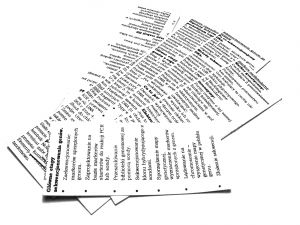A | B | C | D | E | F | G | H | I | J | K | L | M | N | O | P | Q | R | S | T | U-V | W-Z
 |
- Salvage Refers to damaged property an insurance company takes in order to reduce losses after paying an insured for a claim. Insurance companies take salvage rights over property considered to be a total loss. For example a totaled auto would become salvage property of the insurance company. The insured may pay a salvage charge in order to recover the ownership of the salvaged property.
- Schedule is a list of the items or group of items that are covered on one policy. A schedule may also be a list of specific assets, benefits, account charges and credits, or other specific items.
- Self-Insurance is the act of assuming financial risk rather than obtaining insurance from an insurance company. This may be common with large business, for example Portland Oregon’s mass transit bus system Tri-Met self insures. Meaning claims are paid directly from Tri-Met without an insurance company involved. Self-insurance may also refer to employers who take on all or part of the health insurance claims of their employees.
- Severity is the insurance measurement of the size of a loss and may be used to calculate premium rates.
- Sewer Back-Up Coverage is an optional coverage Homeowners may add to provide insurance for sewer back-up.
- Short-Term Disability Income Insurance is a type of disability income coverage providing disability income benefits for a specified benefit period, usually one to five years.
- Solvency is an insurance companies’ ability to pay out on the claims of policyholders. State insurance regulations often require insurance companies to maintain a minimum capital and surplus in order to meet claims needs in the event of catastrophe. There are also specific accounting conventions and limits in place for insurance company investment and corporate activities. Insurance companies must undergo financial ratio tests, and provide financial disclosure.
- Special Risk Insurance is coverage for special, unusual and/or hazardous risks.
- SR-22 is required in many states used to notify the DMV that a driver has auto insurance. Required for high-risk drivers most often DUI, DUII convicted drivers or those with other serious or numerous driving violations. SR-22‘s will require the insurance company to send notice to the DMV of any cancellation or lapse of coverage so the DMV may revoke the license if and when the insurance is no longer valid.
- Standard Risk Class Is an underwriting classification for a proposed insured who meets the criteria of an average risk within the definition of the insurance companies underwriting practices. A Standard risk class will be entitled to purchase an insurance policy without paying extra premium charges or being subject to restrictions for discounts.
- State of Domicile is the state an insurance company is headquartered, incorporated or chartered.
- Stop Loss is any provision within an insurance policy designed to end the insurance company’s losses for a claim at a given point.
- Subrogation is the legal process an insurance company uses after paying a claim to recover the amount of a portion of the amount paid out on the loss from another party legally liable for it.
- Substandard Premium Rates are the premium rates charged to policyholders who are classified as substandard risks. Sometimes known as a special class rate.
- Substandard Risk Class is the insurance underwriting practice to identify a group of proposed insureds who are considered as significantly greater risks than the standard to suffer a loss.
- Supplemental Coverage is an amount of insurance coverage added to the basic insurance coverage specified in the policy.
- Surcharge is an additional charge, cost, fee or tax.
- Surety Bond is a contract guaranteeing the performance of a specific obligation. A surety insurance policy is responsible for making sure the work is completed or paying for the loss up to the bond “penalty” if the contract fails to be completed. Also see Completion Bonds
- Surplus Lines is property and casualty insurance coverage that’s not available with insurance companies licensed in the state where the insurance is needed.
- Surrender Charge is a fee for withdrawals from an annuity contract taken before a specific surrender charge period, usually five to seven years.
Photo credit for this blog entry:  (standard use restrictions apply)
(standard use restrictions apply)
Glossary of Insurance Terms:
A | B | C | D | E | F | G | H | I | J-K | L | M | N | O | P | Q-R | S | T | U-V | W-Z
Families.com Blogs are for informational purposes only. Families.com assumes no responsibility for consumer choices. Consumers are reminded that it is their responsibility to research their choices properly and speak to a certified insurance professional prior to making any decision as important as an insurance purchase.

